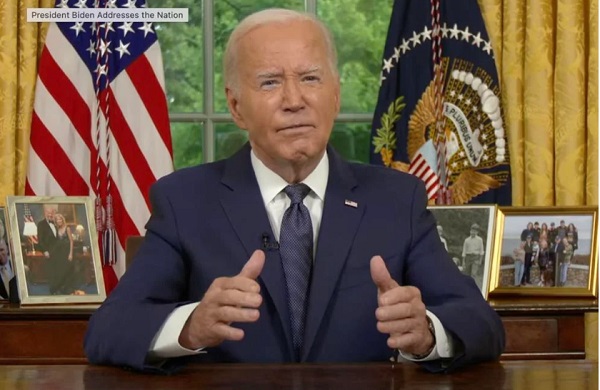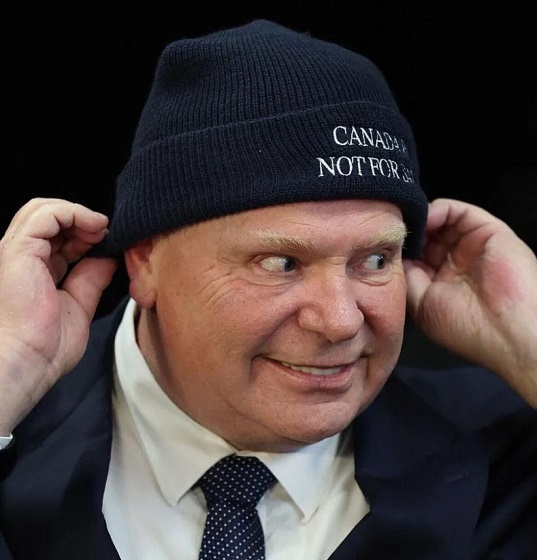International
Out soon? Biden faces growing calls to withdraw 2024 White House bid

From The Center Square
By
President Joe Biden faces a growing tidal wave of opposition and calls for him to leave the presidential race from his own party, with more elected Democrats coming out against him seemingly every day.
Meanwhile, unconfirmed media reports from multiple outlets have suggested Biden is considering bowing out of the race and could make the announcement in the coming days.
Despite those reports, Biden’s campaign released a statement Friday saying that the president will resume campaigning next week.
U.S. Sen. Martin Heinrich, D-N.M., released a statement on Friday calling for Biden to step aside so that another Democrat can take on former President Donald Trump in November.
Heinrich is the third elected senator to do so, joining dozens of House Democrats and other party leaders. This kind of revolt within the party is highly unusual, though Biden does have publicly voiced support from about 75 Democrats, according to a tally from the New York Times.
Most Democrats questioning Biden have made a similar argument: Biden has a great legacy, but he probably can’t beat Trump in November.
A leading Democrat in the House, U.S. Rep. Adam Schiff of California, made that argument earlier this week when he called on Biden to step aside.
“A second Trump presidency will undermine the very foundation of our democracy, and I have serious concerns about whether the President can defeat Donald Trump in November,” Schiff said.
Freshly certified Vice Presidential candidate J.D. Vance took a shot at Biden on Friday, questioning his cognitive decline and questioning if Biden should leave the White House altogether.
“If Joe Biden doesn’t have the cognitive function to run for re-election, then he certainly doesn’t have the cognitive function to remain as Commander-In-Chief,” Vance wrote on X, formerly known as Twitter. “How can any Dem pushing him to drop out of the presidential race, argue in good faith that he should stay on as POTUS?”
Biden’s woes gained steam after his disastrous debate performance at the end of last month put his campaign on defense as traditionally liberal media questioned his fitness and Democrats began calling for him to leave the race.
Trump narrowly survived an assassination attempt last weekend, further rallying his base and making him more sympathetic to Independents. Even before the assassination attempt, Trump led Biden nationally in polling and in nearly every key battleground state.
Biden has so far publicly insisted he will remain the party’s nominee. Since the assassination attempt and Biden began quarantining for his COVID-19 infection, the pressure has ramped up even more.
If Biden does drop out, a key question will be whether he decides to endorse Vice President Kamala Harris or to leave the Democratic National Convention in August open for other likely contenders, such Michigan Gov. Gretchen Whitmer, California Gov. Gavin Newsom or others to make a play for the nomination.
Meanwhile, Republicans and Trump’s fiercest supporters have been propelled by Trump’s wins, his attempted assassination survival, and seem more confident than ever about November.
“The Democrat party is in more chaos than ever,” U.S. Rep. Marjorie Taylor Greene, R-Ga., wrote on X, formerly known as Twitter. “While they try to force out a feeble old man who refuses to give up the wheel, they remain unified on disastrous policies that have ravaged our country. Will Biden drop out? Maybe.
“Will it matter? No.
“The American people need Donald Trump, and in November, we’re sending him back to the White House,” she added.
Daily Caller
Trump Reportedly Planning Ground Troops, Drone Strikes On Cartels In Mexico


From the Daily Caller News Foundation
The U.S. is reportedly planning to send troops and intelligence officers into Mexico to target drug cartels, former and current U.S. officials told NBC News Monday.
Training has reportedly already begun for such a mission, two current U.S. officials told NBC News, though no deployment to Mexico is imminent. The plan would deploy both U.S. military and CIA personnel on the ground in Mexico and include drone strikes on cartel targets, according to the report. If put into action, it would be a significant escalation in President Donald Trump’s ongoing campaign against Latin American drug cartels.
“The Trump administration is committed to utilizing an all-of-government approach to address the threats cartels pose to American citizens,” a senior administration official told NBC in response to the news.
Dear Readers:
As a nonprofit, we are dependent on the generosity of our readers.
Please consider making a small donation of any amount here.
Thank you!
If the mission is approved, the administration reportedly plans to keep the operation secret and not publicize any strikes, unlike the video-documented attacks on cartel boats in the Caribbean and Pacific that Trump has highlighted in the past, according to the report.
The plan calls for drone strikes against drug labs in Mexico as well as top cartel leaders, the officials told NBC News, and is not intended to undermine the Mexican government.
The U.S. troops will reportedly mostly be Joint Special Operations Command (JSOC) members, who operate under the authority of the intelligence community, two current officials told NBC News. Pat administrations have deployed the CIA to aid in missions against cartels from the Mexican government, but have never gotten involved directly as the reported plan prescribes.
The CIA and the White House did not immediately respond to the Daily Caller News Foundation’s request for comment.
Business
Trump’s Tariffs Have Not Caused Economy To Collapse


From the Daily Caller News Foundation
By Mark Simon
The APEC Summit in Korea last week marked a pivotal moment for U.S. trade policy, delivering tangible wins for American interests. Solid deals were struck with South Korea, while the U.S. and China de-escalated their long-simmering trade war—a clear positive for President Trump. In the chaotic world of Donald Trump, such normalcy disappointed the news media and foreign policy pundits, who grumbled that the event lacked the drama of a disaster.
Yet, as Trump departed Busan, a deeper transformation unfolded, largely overlooked by observers. In just two days, President Trump orchestrated the most significant shift in U.S. trade strategy since China’s 2001 entry into the World Trade Organization (WTO).
The real triumph? Widespread acceptance by Asian trading partners of U.S. tariffs as a cornerstone of a reimagined American economic model. This acceptance dismantles nearly a century of unwavering belief in low tariffs as the unassailable path to global prosperity.
Trump’s tariff approach disrupts the post-World War II global trading system, particularly the U.S.-championed free-trade orthodoxy embraced by both parties for over 50 years. By wielding tariffs effectively, Trump challenges the free-market gospel enshrined in the WTO and echoed by World Economic Forum elites and corporate-sponsored Washington think tanks like AEI and CATO, which decry tariffs as heresy.
At APEC, there was no fiery backlash—only quiet nods to moderate tariffs as fixtures in the evolving economic order. Leaders from across the Asia-Pacific assessed the tariffs’ impacts and moved forward without spectacle, signaling a pragmatic pivot toward Trump’s view of international commerce.
Historically, tariff reductions in Asia stemmed from U.S. pressure to open markets. Mercantilist instincts run deep in most Asian governments—except in freewheeling Hong Kong and Singapore. These nations, built on exports inside protected markets, grasp how tariffs can revitalize U.S. manufacturing and bolster federal revenue. Unlike America’s one-sided openness to Asian imports, Trump’s reciprocity feels like overdue fairness.
As a former free-market purist who once decried tariffs, I initially missed their nuance in Trump’s arsenal. Tariffs impose costs, but the genius lies in offsetting them strategically. Trump’s aggressive deregulation, sweeping tax reforms, and drive for rock-bottom domestic energy prices mitigate burdens and generate a net economic surge—one that Asian leaders implicitly endorsed.
This “internal free-market trio” forms the bedrock of the new U.S. paradigm: moderate tariffs generate revenue and incentivize factory repatriation; deregulation slashes red tape; tax cuts keep capital flowing competitively; and abundant, cheap energy undercuts foreign advantages.
Together, they magnetize global investment, upending a century of free-trade dogma. Energy dominance is key. Through promotion of domestic oil, gas, and renewables, Trump has driven U.S. energy costs 30–50% below those in Europe or much of Asia. For capital-intensive sectors like steel, semiconductors, and electric vehicles, this is structural superiority, not subsidy. Layer on the 2017 Tax Cuts and Jobs Act—slashing the corporate rate to 21% and allowing immediate capital expensing—and the math tilts toward U.S. production. Tariffs may raise import prices by 20–30%, but deregulation accelerates cost-cutting, while energy savings absorb part of the hit.
Critics claim tariffs ravaged the economy post-2018, but COVID-19, not tariffs, triggered the downturn. Trump’s initial round was a successful pilot, extended by Biden—yet without Trump’s deregulation and energy surge, the tariffs became un-offset weight. Blanket cost hikes under Biden stifled growth; Trump’s selective offsets ensure expansion.
America’s edge sharpens as rivals falter. Europe, shackled by leftist policies, environmental mandates, and the Ukraine quagmire, hemorrhages capital to the U.S. In North Asia—China, Korea, Japan, Taiwan—demographic headwinds make investments unappealing compared to North America’s burgeoning market. Aging populations and shrinking workforces amplify this disparity.
APEC underscored America as a vibrant, tariff-protected haven primed for onshoring. Amid Asia’s labor crunch, nations view the U.S. as an investment beacon, mirroring Japan’s model: a high-value exporter offloading low-end manufacturing while retaining competitiveness. Summit chatter revealed minimal tariff gripes. China voiced tepid concerns over escalations, but these seemed rhetorical—testing boundaries rather than igniting conflict.
To free-trade zealots, Trump’s heresy is demolishing sacred economic theory. Past protectionists erred by isolating tariffs without cost-lowering measures. Trump integrates them: selective duties paired with deregulation, technological leaps, and economic decentralization beyond urban centers.
In equilibrium, tariffs harvest revenue and reclaim jobs, capitalizing on America’s fiscal and regulatory advantages. Trump’s blueprint restores balance to free trade, honoring national sovereignty while exposing borderless markets’ perils. It proves moderated protectionism can ignite growth, spur innovation, and draw capital—heralding a bolder, self-reliant American century.
Mark Simon is former group director for Next Digital, parent company for Apple Daily, the leading pro-democracy newspaper in Hong Kong until it was forced to close in 2021.
-

 MAiD2 days ago
MAiD2 days agoStudy promotes liver transplants from Canadian euthanasia victims
-

 Business2 days ago
Business2 days agoCanada has given $109 million to Communist China for ‘sustainable development’ since 2015
-

 Crime1 day ago
Crime1 day agoPublic Execution of Anti-Cartel Mayor in Michoacán Prompts U.S. Offer to Intervene Against Cartels
-

 Automotive2 days ago
Automotive2 days agoCarney’s Budget Risks Another Costly EV Bet
-

 Business2 days ago
Business2 days agoYou Won’t Believe What Canada’s Embassy in Brazil Has Been Up To
-

 Environment2 days ago
Environment2 days agoThe era of Climate Change Alarmism is over
-

 Business2 days ago
Business2 days agoMystery cloaks Doug Ford’s funding of media through Ontario advertising subsidy
-

 Censorship Industrial Complex2 days ago
Censorship Industrial Complex2 days agoSenate Grills Meta and Google Over Biden Administration’s Role in COVID-Era Content Censorship






